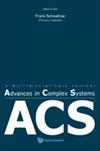Is Disruption Decreasing, or is it Accelerating?
IF 1
4区 数学
Q4 MATHEMATICS, INTERDISCIPLINARY APPLICATIONS
引用次数: 0
Abstract
A recent highly publicized study [Park, M., Leahey, E. and Funk, R. J., Papers and patents are becoming less disruptive over time, Nature 613 (2023) 138–144] claiming that science has become less disruptive over recent decades represents an extraordinary achievement but with deceptive results. The measure of disruption, CD 5 , in this study does not account for differences in citation amid decades of exponential growth in publication rate. In order to account for both the exponential growth as well as the differential impact of research works over time, here we apply a weighted disruption index to the same dataset. We find that, among research papers in the dataset, this weighted disruption index has been close to its expected neutral value over the last fifty years and has even increased modestly since 2000. We also show how the proportional decrease in unique words is expected in an exponentially growing corpus. Finding little evidence for recent decrease in disruption, we suggest that it is actually increasing. Future research should investigate improved definitions of disruption.颠覆性变革是在减少还是在加速?
最近一项广为宣传的研究[Park, M., Leahey, E.和Funk, R. J.,论文和专利随着时间的推移变得越来越不具破坏性,Nature 613(2023) 138-144]声称科学在最近几十年变得越来越不具破坏性,这代表了一项非凡的成就,但其结果具有欺骗性。在这项研究中,中断的测量,CD 5,并没有考虑到几十年来出版率呈指数增长的引用差异。为了考虑指数增长以及研究工作随时间的不同影响,我们在这里对同一数据集应用加权干扰指数。我们发现,在数据集中的研究论文中,这一加权破坏指数在过去50年里一直接近其预期的中性值,甚至自2000年以来略有增加。我们还展示了如何在指数增长的语料库中预期唯一单词的比例减少。我们发现,几乎没有证据表明干扰最近有所减少,因此我们认为,干扰实际上在增加。未来的研究应该对颠覆的定义进行改进。
本文章由计算机程序翻译,如有差异,请以英文原文为准。
求助全文
约1分钟内获得全文
求助全文
来源期刊

Advances in Complex Systems
综合性期刊-数学跨学科应用
CiteScore
1.40
自引率
0.00%
发文量
121
审稿时长
6-12 weeks
期刊介绍:
Advances in Complex Systems aims to provide a unique medium of communication for multidisciplinary approaches, either empirical or theoretical, to the study of complex systems. The latter are seen as systems comprised of multiple interacting components, or agents. Nonlinear feedback processes, stochastic influences, specific conditions for the supply of energy, matter, or information may lead to the emergence of new system qualities on the macroscopic scale that cannot be reduced to the dynamics of the agents. Quantitative approaches to the dynamics of complex systems have to consider a broad range of concepts, from analytical tools, statistical methods and computer simulations to distributed problem solving, learning and adaptation. This is an interdisciplinary enterprise.
 求助内容:
求助内容: 应助结果提醒方式:
应助结果提醒方式:


